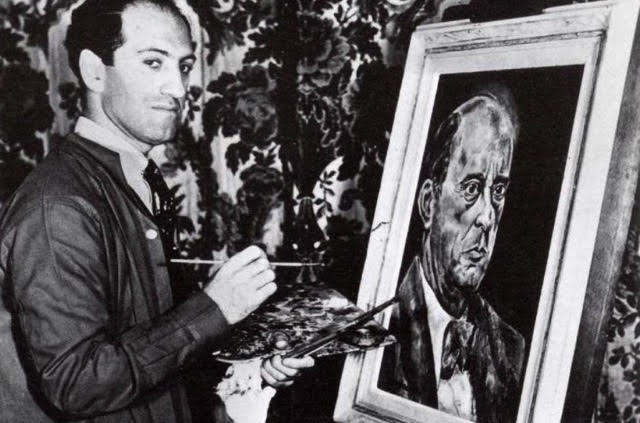Desperate musicians who are driven to paint
I know several professional pianists who will admit under pressure that they find their work ultimately unsatisfying. Not because of the crowded marketplace, the dreary practice rooms, the clapped-out pianos or too many exhausting tours. No, they are tired of something more basic — the endless repetition of notes penned by someone else.
True artists seek self-expression, artistic adventure. They feel the urge to “own” their work. But written music places strict limits on all but the most marginal departures from notation. Some musicians eventually realize they are mere messengers whose teachers steer them relentlessly back to the page.
This may explain why so many pianists and other professional musicians also paint. Of all the arts, it is painting that grants them the most licence for creative release.
I have been collecting names and samples of musicians’ work for the past year or so, and have been surprised at how committed many became, often mounting their own exhibitions and publishing their visual creations, at least on the internet.
Moreover, I find similar urges among academics, business executives, magicians and hack journalists.
Alexander Motyl, a novelist and political science professor at Rutgers University, Newark, N.J., finds painting a release from the tyranny of words – much as musicians fight the tyranny of music. “There are no words, no speech, no ‘thinking’ in my painting,” he tells me. “It is just lines and colors and spaces and visual creations. There is no method to painting. Stuff happens and, suddenly, you realize, gosh, this is really good. In writing, you have to make stuff happen. Painting, in contrast, has a touch of the miraculous about it.”
Somewhere among the painters I find myself, once a struggling pianist, then a working journalist, now a successful portrait painter. My first book collecting music-makers’ ecstatic faces has just appeared and my recent one-man show of 70 watercolors attracted press coverage and a few commissions.
My primary professional focus today is as a music critic, mainly of pianists or other classical musicians, many of whom tell me they eventually tire of sawing away or hammering the clavier to someone else’s tune. These frustrations are what has driven leading musicians, past and present, to the drawing board.
Among them are Felix Mendelssohn, John Cage, Arnold Schoenberg, George Gershwin, David Dubal, Stephen Hough, Ingrid Fliter, Russell Sherman and others. (Even Mozart doodled funny faces in the margins of his scores.)

Left-handed violinist Paul Klee was equally talented in music and art, ultimately dropping music altogether. He quickly became a leading avant-garde painter, and while at Bauhaus in Weimar, he attempted to apply the principles of music composition to his painting.
I too find release in painting, sometimes spontaneously. I am often seized by the impulse to sketch a player when I see him or her emotionally high in public.
Musicians’ faces provide great material for the artist, mirroring the creative process and thereby inspiring my approach to their portraits -- joyful, tragic or just deep concentration. In my book, I brought together a critical appreciation of the musicians and portraits of those I have interviewed, reviewed, admired over the past few years – plus nine conductors who have led the Orchestre National Bordeaux Aquitaine since 1972.
[For Michael Johnson's book on amazon, please click here.]
There is a peculiar pleasure in portraiture. The artist must take an intimate, even intrusive, approach to detail, exploring the eyes, noses and lips – their crinkles, wrinkles and folds -- to make the subject come alive. An expressive face can reveal something of the individual’s inner life, and that is what I seek. It takes time to study these faces. The English painters John Singer Sargent and Lucian Freud were known for their multiple false starts in oils, scraping away the face and starting over and over. Leonardo da Vinci invested five years, off and on, in his “Mona Lisa”.

Pianist Alfred Brendel makes a good subject because of the humor he finds
lurking in all kinds of music. Another outstanding subject, Alessandro Deljevan, a semifinalist at the Van Cliburn International Piano Competition in 2013, throws himself into his performances with abandon.Conductors are some of the most emotive performers in public. Yutaka Sado, Alain Lombard, Kent Nagano, and Paul Daniel clearly lose themselves in the music. I have seen Daniel leap so joyfully that both feet left the podium at the same time.
Studying faces puts the artist in a spooky symbiosis with his or her subject. I know I have captured the pianist when I can hear the music or see the subject come to life. I stop short of a related spookiness in the very spiritual conductor Seiji Ozawa, who asserts that intensive study of an orchestral score eventually gives him the feeling that it is his music, that he composed it.
Music can get inside you that way.
END
This article is brought to you by the author who owns the copyright to the text.
Should you want to support the author’s creative work you can use the PayPal “Donate” button below.
Your donation is a transaction between you and the author. The proceeds go directly to the author’s PayPal account in full less PayPal’s commission.
Facts & Arts neither receives information about you, nor of your donation, nor does Facts & Arts receive a commission.
Facts & Arts does not pay the author, nor takes paid by the author, for the posting of the author's material on Facts & Arts. Facts & Arts finances its operations by selling advertising space.

